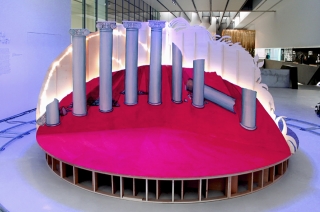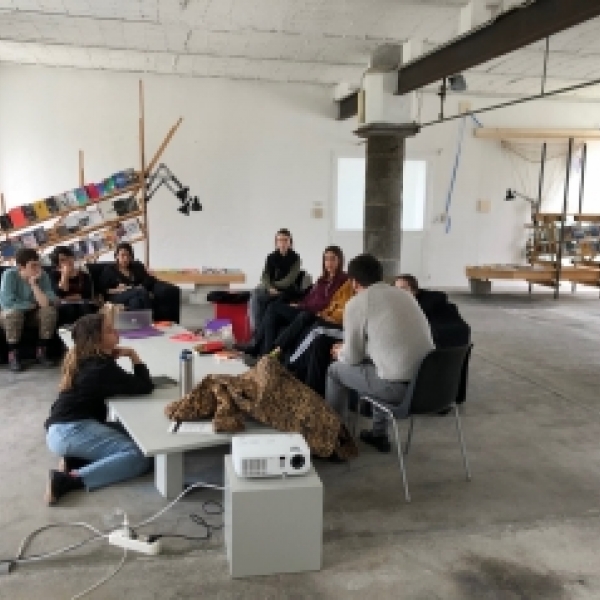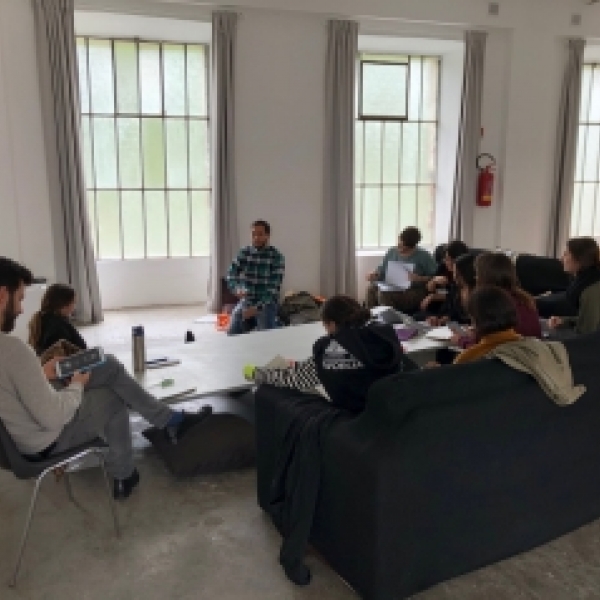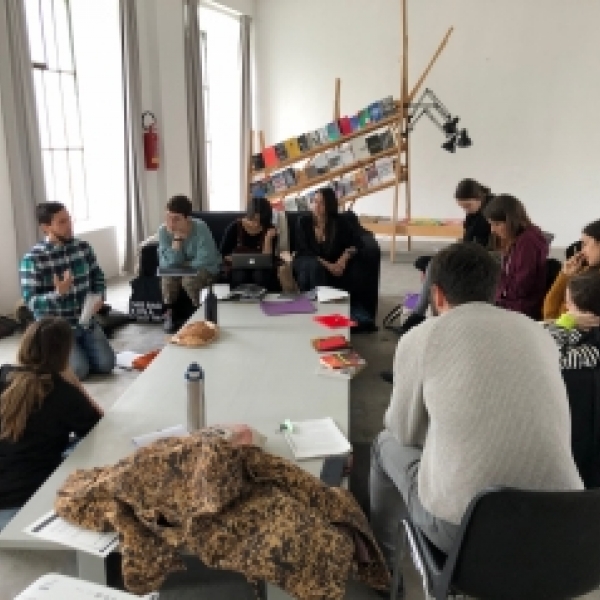Proscenium
In her work, Adelita Husni-Bey uses anarco-collectivist and anti-authoritarian forms of pedagogy as means of understanding power relations which give rise to political agency and processes of emancipation, haptically and through embodiment. Challenging rules and the ways we approach togetherness, Adelita’s projects often include poetry and the use of performance involving the authors. Her employment of pedagogical methods leads to the collective creation of mise en scènes that allow participants to come to terms with their own relation to the social and economic power dynamics of our era. For her ongoing project “White Paper: The Law” (2014), the artist initiated a series of Public Drafting Meetings involving stakeholders such as jurists, undocumented migrants, squatters, housing right activists and lawyers in the writing of a para-legal document called the ‘Convention on the Use of Space’ (CUS). The CUS proposes social use (or use value) as predominant over exchange value and holds all the tension that such a claim generates, in contrast with the enclosures of private property and the adoption of the squatting ban across Europe.
For her film installation “The Reading / La Seduta”, presented at the Italian Pavillion of Venice Biennale 2017, the artist worked with a group of young people and artist, friend and astrologer Tina Zavitsanos. Using a specially designed tarot deck and exercises based on the Theatre of the Oppressed, participants reflected on their own connections to the environment and to the exploitation of the earth, examining a series of complex questions related to ideas of extraction, threat, technology, use, value and vulnerability.
Taking the notion of the institution as a stand-in for centres of power, during her module PROSCENIUM, Adelita Husni-Bey proposes to explore the institution as a form reliant on performance to operate and maintain control, through the participatory use of performance and writing. By discussing and mimicking institutional procedures, functions and services, she will be choreographing, with the participants, three moments of the “arc of an institutional birth-death continuum”.
MODULE DESCRIPTION
A proscenium is the arch that frames the stage and delimits what is within and outside the performative space. The workshop will be focused on understanding how institutions are formed and shaped through performativity within varying frameworks, including museums, prisons and heterosexual relations.
“Law is not literally internalized, but incorporated, with the consequences that bodies are produced which signify that law on and through the body.” 1
How does performativity give institutions their form? What is the role of performativity in operations that claim ‘justice’? How is naming (nomos) an operating principle in both performance and law? What is meant by scenographic/theatrical elements of institutions? How do theories of complicity, accompaniment and mis-recitement offer ways to go off script?
Over the course of three ‘moments’ that will represent the arc of an institutional birth-death continuum, participants will be tasked with discussing and performing institutions of their choosing under the guidance of Adelita’s use of creative writing, performative exercises, and seminar-style reading sessions. The first day will focus on the birth of the institution, the ‘naming’ of the institution and the analysis of its primary functions and services, the second day will be ‘peak institution time’, when the institution’s operations are harmonized - on this day the institutions will interact. The third and final day will explore the decline or death of the institution including explorations of what has lead the institution to wither or develop into another form. Understanding this exercise as an intersectional analysis of power, each participant will create or use a pre-existing institutional framework as a starting point in developing their pathway through the workshop. The workshop will rely on works by Achille Membe, Denise Ferreira Da Silva, Michelle Castaneda, Michel Foucault, Jackie Wang, Fred Moten among others. No prior knowledge or use of performance or creative writing is necessary.

BIOGRAPHY
Adelita Husni-Bey is an artist and pedagogue interested in anarco-collectivism, performativity, law and urban studies. She organizes workshops and produces publications, radio broadcasts, archives and exhibition work focused on using non-competitive pedagogical models through the framework of contemporary art. Working with activists, architects, jurists, schoolchildren, spoken word poets, actors, urbanists, physical therapists, athletes, teachers and students across different backgrounds, her work focuses on unpacking the complexity of collectivity. To make good what can never be made good: what we owe each other. Recent solo exhibitions include: Chiron, New Museum, 2019; White Paper: On Land, Law and the Imaginary, Beirut, Cairo, 2014, Casco Art Institute: Working for the Commons, Utrecht, 2015, Centro de Arte dos de Mayo, Mostoles, A Wave in the Well, Sursock Museum, Beirut, 2016; Movement Break, Kadist foundation, 2015; Playing Truant, Gasworks, 2012. She has participated in Being: New Photography 2018, MoMA, 2018; Dreamlands, Whitney Museum, 2016; The Eighth Climate, 11th Gwangju Biennale, 2015; Really Useful Knowledge, Reina Sofia museum, 2014; Utopia for Sale?, MAXXI museum, 2014; and has held workshops and lectures at ESAD Grenoble, 2016; The New School, 2015; Sandberg Institute, 2015; Museo del Novecento, 2013; Temple University, 2013; Birkbeck University, 2011 amongst other spaces. She is a 2012 Whitney Independent Study Program fellow, a 2016 Graham Foundation grantee and has represented Italy at the 2017 Venice Biennale of Art with a video rooted in anti-extractivist struggles.* The participation fee includes accomodation and breakfast.



